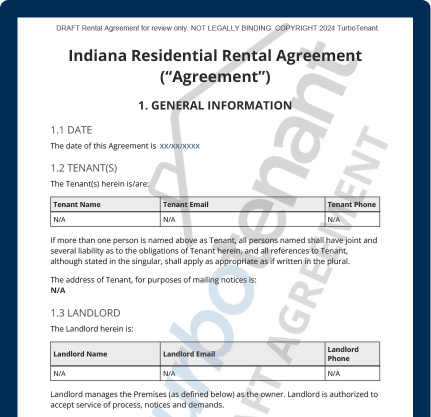Indiana landlord-tenant law is the framework by which rentals are governed in the state. Understanding these guidelines is essential for renters and landlords to ensure a positive rental experience, ensure Indiana tenant rights are appropriately considered, and avoid potential miscommunication or conflict.
In this guide, we’ll review every angle when it comes to renting property in Indiana, including:
- Fair housing laws and how they affect landlords and tenants
- The requirements and importance of Indiana lease agreements
- Rules around handling and returning security deposits
- Proper eviction procedures
Read on to learn everything you ever wanted to know about landlord-tenant law in Indiana.
Key Findings: Landlord-Tenant Rights & Responsibilities
The state legislature establishes Indiana landlord-tenant rights to protect each party in rental agreements. While landlords must follow some federal guidelines, each state generally has its own laws governing the relationship.
Indiana landlords have the right to:
- Collect rent on time: Landlords are not required to give tenants a grace period. They can charge late fees as long as the lease agreement lists them.
- Collect a security deposit: Indiana landlords can keep security deposits in any account they’d like. In some states, landlords must keep deposits in interest-bearing accounts, but that’s not the case in Indiana. However, landlords must return deposits within 45 days of the tenant moving out.
- Enter the rental unit: Unless in an emergency, landlords must give advance notice before entering a tenant’s unit — 24 hours’ notice is typical.
- Screen tenants: Indiana does not have state laws regulating background checks, but a landlord’s renting decision must be without discrimination, per federal fair housing laws.
- File for eviction: Landlords may initiate eviction proceedings when tenants violate a lease or don’t pay rent.
Indiana landlords are responsible for:
- Providing tenants with a habitable unit: Habitability includes working running water, heat, electricity, and a sound structure.
- Ensuring the functionality of smoke detectors: Smoke detectors must be inspected and operational at the start of the lease.
- Repairing and maintaining the property: Landlords must make timely repairs to keep the property in a habitable condition.
- Not retaliating against tenants: Landlords can’t retaliate by raising rent or decreasing services when a tenant makes valid complaints.
- Providing tenants with legally required disclosures: Federal and Indiana laws require landlords to make additional information available to tenants at lease signing. For a list, visit our Indiana lease agreement article.
Indiana tenants have the right to:
- Live in a habitable unit: The unit must be clean, with working plumbing and heat and feature doors and windows that lock.
- Privacy: Landlords must give advance notice before entering a tenant’s unit and can only do so at reasonable times.
- Request maintenance and repairs: Landlords are responsible for necessary upkeep beyond normal wear and tear.
- Take legal action if necessary: If a landlord does not meet their responsibilities, tenants may take issues to court.
- The return of their security deposit: Landlords must return security deposits within 45 days of moving out.
Indiana tenants are responsible for:
- Paying rent on time: On-time payments help avoid complications like late fees and eviction proceedings.
- Keeping the property reasonably clean: Typically, minor repairs and general upkeep are tenant responsibilities.
- Reasonably using the property: Tenants should use all provided appliances and services in their intended manner.
- Following the lease agreement: The lease is the guiding document for the rental arrangement. It’s legally binding, and both parties are bound to its terms for the duration of the agreement as long as the document doesn’t violate any laws.
- Providing notice when repairs are needed: Tenants must notify the landlord of any repair issues.
Best Practices for Screening Prospective Tenants
It’s common practice to screen prospective tenants before choosing the right one for your unit. Generally, the rental application fee covers the screening. Indiana laws don’t limit the amount that landlords can charge.
Indiana landlords can review a tenant’s criminal and credit history without restrictions, except as discussed in the federal Fair Credit Reporting Act and Fair Housing laws. However, landlords cannot discriminate based on specific criteria (more on that below).
As a free property management software for landlords, TurboTenant offers comprehensive Tenant Screening features at no cost to landlords.
Compliance with Fair Housing Laws in Indiana
Federal law prohibits housing discrimination based on race, religion, gender, familial status, or disability. These laws make it more equal for tenants to find a place to live. Ultimately, landlords must treat all potential tenants the same and without preference.
What actions are considered housing discrimination?
Housing discrimination can take a number of forms, including:
- Refusing to rent to someone because they’re part of a protected class
- Setting different lease terms based on their status
- Failing to provide adequate consideration for people with disabilities
Additionally, landlords cannot advertise rentals with discriminatory language. For instance, rental listings cannot suggest that landlords will only accept tenants without children or tenants from a specific country.
How can discrimination be avoided in rental practices?
Landlords should use the same criteria to screen all potential tenants, ensuring fair treatment for everyone applying for their rental.
Landlords should consider the following to avoid discrimination:
- Standardized screening criteria
- Consistently applying criteria across applicants
- Accommodation for disabilities and ADA compliance
- Training staff in anti-discriminatory practices
What are the repercussions for fair housing violations?
Violating fair housing laws can result in legal and civil penalties for landlords, such as fines, lawsuits, or the loss of a rental license. Consider something else: You could face reputational damage from fair housing violations, making it more challenging to find tenants.
If you encounter accusations of discriminatory practices, you should respond promptly. Document everything, and consult a housing attorney for the appropriate next steps.
Indiana Lease Agreements
The state of Indiana does not require leases between landlords and tenants; however, it is always recommended to have a written contract to ensure a smooth renting experience. A lease is the best way to ensure all parties are on the same page, create accountability, and provide a road map for how the term should go.
While the lease length is flexible, it is typically either a month-to-month or fixed-term contract.
Month-to-month leases are also known as “tenancy-at-will” and can be terminated by landlords or tenants with at least 30 days written notice. For fixed-term leases (usually a one-year period), 90 days’ notice must be given when there is no intention to renew.
Which lease terms are legally required in Indiana?
While Indiana does explicitly call out what must be in a lease to meet the standard of a legally binding contract, the lease should include:
- Names of landlord and tenant
- Description of the property, including address
- The duration of the lease
- Rent amount, due date, and acceptable payment methods
- Security deposit terms
- Maintenance and repair responsibilities
- Landlord entry conditions
- Grace period, late fees, and penalties, if applicable
What constitutes legal renting in Indiana?
Legal renting typically involves a lease agreement between landlord and tenant, though it’s not required for tenancies under three years. The unit must meet basic habitability standards by providing heating, plumbing, and electrical services. If it does not meet these standards, landlords must make the repairs promptly.
Indiana landlords must follow all state guidelines regarding occupancy limits, building codes, and local health ordinances to avoid potential liability and protect Indiana tenant rights.
What tenant documentation is required?
Landlords may require tenants to show the following documentation as part of the leasing process:
- Valid Photo ID in the form of a driver’s license, state ID, passport, or military ID
- Proof of income in the form of bank statements, pay stubs, or tax returns
- References from past landlords
- Employment verification from your employer
- Criminal background check*
- Credit screening*
*The landlord often conducts these screenings as part of the application fee.
Landlords should keep records of all tenant documentation if questions arise regarding the acceptance process.
What are the mandatory landlord disclosures in Indiana?
Landlords in Indiana must make several disclosures to tenants when they sign a lease. These disclosures, which are in addition to the lease agreement, allow landlords to provide tenants with important information about the rental unit.
Indiana requires landlords to disclose:
- The existence or knowledge of any lead-based paint or lead-based paint hazards in units constructed before 1978.
- The name and address of the person who will directly manage the unit
- Written notice of working smoke detectors
- If the unit is in a flood zone
- Specifics around providing water and sewage services and an itemized list of the fees charged
Security Deposits in Indiana
Landlords typically ask for a security deposit to safeguard their property from potential damage or to discourage tenants from committing lease violations or not paying their rent.
What are the guidelines for security deposit collection?
Indiana landlord-tenant law does not limit the amount a landlord can charge for security deposits, and landlords are not required to pay interest on the deposits. Additionally, no state statute dictates how or where security deposits are held.
When can deductions be made from security deposits?
Landlords may deduct funds from the security deposit for unpaid rent, unpaid utilities, or damages beyond normal wear and tear.
How should security deposits be returned?
Indiana landlords must return security deposits within 45 days of the lease agreement’s termination. If they intend to withhold funds for any of the above reasons, landlords must inform tenants in writing and provide an itemized list of the deductions when they return the remainder.
Maintenance Responsibilities of Landlords
Indiana tenant rights require that landlords maintain the unit to a minimum habitability standard. This means essential utilities must be in good working condition and, when they’re not, must be repaired in a reasonable amount of time.
What are the legal standards for property conditions?
The implied warranty of habitability that Indiana landlords are required to maintain means that the following elements must be in good working condition to be considered a habitable unit:
- Plumbing
- Heating
- Electrical systems
- Smoke detectors
- Safe access and exits
- Sound structural integrity
What is the proper protocol for repairs?
For necessary repairs other than cosmetic issues, tenants must notify the landlord in writing, describing the issue and the date of the request. While Indiana landlord-tenant law does not specify a timeframe by which the landlord must make the repairs, they should be made within a reasonable window.
Unlike many states, Indiana does not allow tenants to repair the issue themselves and deduct the amount from the rent. If a landlord does not make a repair that threatens the health and safety of the tenants or the habitability of the unit, tenants should file a complaint with local authorities or take legal action.
Do landlords need to give tenants advance notice before accessing a rental property?
Indiana landlords should provide reasonable notice — typically a minimum of 24 hours — before entering the property, except in cases of emergency.
Landlords who fail to give proper notice could be liable for landlord harassment, which could result in legal penalties.
Late Rent Fee Regulations
There are no state requirements to allow a grace period for paying rent late or laws limiting the amount of late fees landlords can charge.
Landlords in Indiana can charge late fees for late rent payments, but the lease agreement should list that information.
Rent Control in Indiana
Rent control is the process by which a state or local government limits the amount that a landlord can raise the rent on a tenant renewing their lease or on a month-to-month agreement. There are no laws regulating rent control in Indiana — in fact, rent control laws are expressly prohibited by law in the state.
Landlords in Indiana can raise the rent by any amount on a month-to-month lease by providing at least 30 days’ notice of the increase. They may not increase the rent on a fixed-term lease until the term ends and are not required to give prior notice before that happens.
Lease Renewal and Termination
Landlords must give month-to-month tenants at least 30 days’ notice when they plan on terminating their tenancy. No notice is required to inform a tenant when they do not intend to renew a fixed-term lease — it simply ends when the term ends. Indiana landlords are not obligated to renew a fixed-term lease when the agreement is over.
As a legal contract, fixed-term leases can only be broken without penalty in specific legal circumstances. Some of these allowable instances are:
- The tenant is entering active military duty
- The tenant, or a minor on the property, is the victim of domestic violence, sexual violence, or stalking
- The unit has become uninhabitable
- Landlord harassment
Similarly, landlords must show a legally valid reason to cancel a fixed-term lease before the term ends. These reasons include:
- Lease violation by the tenant
- An early termination clause in the lease
- The landlord is taking the unit back to occupy the property themselves
Tenants who end a lease early without a valid reason could be responsible for legal penalties and the entire amount of rent left on the lease term. Indiana landlords have a “duty to mitigate,” meaning they must try to re-rent the unit as soon as possible, which will release the tenant from financial responsibility.
Eviction Procedures for Indiana Landlords
The specifics of how evictions are handled can vary quite a bit from state to state, so Indiana landlords and tenants must understand how their state handles them.
In this section, we’ll review what triggers an eviction, how the process works, and how landlords can take their property back once the eviction has been completed.
What justifications exist for eviction?
Indiana landlord-tenant law specifies that evictions can occur due to:
- Non-payment of rent
- Lease violations
- Illegal activity
- Holdover tenants (tenants that stay in the unit after the lease has expired and have not transitioned to a month-to-month lease)
- Tenant-caused health or safety hazards
Indiana is a just cause (fault) state, meaning landlords must display proper cause to evict a tenant. Following the process exactly is imperative, as attempting to evict a tenant on your own (or a self-help eviction) is illegal and shouldn’t be attempted.
Any violations that spur an eviction should be documented as thoroughly as possible. This information could be used as evidence in the eviction hearing.
What is the eviction process?
In Indiana, the eviction process works like this:
- The landlord delivers a notice to vacate
- For non-payment of rent, a 10-day notice to pay or quit is required
- For lease violations, reasonable notice to cure or quit is required
- If the tenant does not pay or cure the violation, landlords can file for eviction with the court
- A court hearing will occur, where both landlord and tenant may present their cases
- The judge rules on the eviction and issues a writ of execution if the eviction suit is successful
- The sheriff removes the tenant, if necessary
- Possession of property is returned to the landlord
How is property reclaimed after eviction?
Once the writ of execution has been issued, a law enforcement officer will deliver it to the tenant if they have not already vacated the property. Only a law enforcement officer may remove the tenant, as self-help evictions are illegal, and landlords should not attempt removal on their own.
Indiana landlords should take inventory of any personal property left behind by tenants, but there is no statute dictating how long a landlord must store the property before disposing of it. Therefore, landlords should give a reasonable amount of time for the tenant to respond before disposal.
Local Ordinances for Landlords and Tenants
When researching Indiana landlord-tenant law, 2024 hasn’t brought many changes; however, it’s important to stay up-to-date on all guidelines and laws that dictate property management locally.
While there hasn’t been much new Indiana landlord-tenant law, cities and counties also enact laws that can impact landlords and Indiana tenant rights.
Municode is great for finding local ordinances and staying current with changing local laws.
Federal Landlord-Tenant Laws
As we’ve seen above, local and state laws aren’t the only regulations in place. The federal government has enacted laws and oversees certain agencies that also impact renting property.
Laws like the Fair Housing Act and the Americans with Disabilities Act can significantly impact landlords.
The Consumer Financial Protection Bureau oversees financial regulations related to housing, and monitoring relevant news can ensure your properties stay in legal compliance.
Managing Tenant Legal Disputes as an Indiana Landlord
Landlords should take care to handle all legal disputes between themselves and tenants to ensure they don’t escalate more than they should. It’s vital that landlords thoroughly document everything, including communication, notices, photographs, or physical evidence of any lease violation or other issue.
Landlords and tenants can also consider some legal options that Indiana provides, including:
- Indiana Legal Services (ILS) provides free legal assistance to low-income tenants
- The Indiana State Bar Association has legal resources for both landlords and tenants who are engaged in property disputes
- The Indiana Tenant Rights hotline can provide tenants with resources if they feel they’re being unfairly or unlawfully evicted
Navigate Your Landlord-Tenant Relationship with TurboTenant
Navigating Indiana landlord-tenant rights can be tricky for new and experienced landlords, so TurboTenant is here to help. TuboTenant is a free-to-use, online property management software that offers landlords and tenants a slew of features to make rental management a piece of cake, including:
- Online rent collection
- Maintenance and repair tracking
- Customizable, legally-reviewed lease agreements
- Comprehensive tenant screening
- Tenant and landlord messaging system
Effectively managing your property while considering Indiana tenant rights has never been easier. So, sign up for a free TurboTenant account today and make your property management experience a breeze.
Landlord-Tenant Law in Indiana FAQs
What are landlords required to provide by law?
Indiana landlords must provide tenants with a safe and habitable living environment, which includes working plumbing, heating, and electricity. The unit also must have working windows and doors with functional locks to be considered habitable. Landlords and tenants are bound not only by federal, state, and local laws but also by the lease agreement.
While not required, landlords often provide tenants with appliances, laundry facilities, and well-maintained common areas.
What is the proper notice period for lease termination?
The proper notice for lease violations varies based on the type of tenancy and the reason for termination:
- Fixed-term leases typically end on the last day of the lease term, and landlords are not required to give additional notice if they do not intend to renew a fixed-term lease
- Month-to-month leases require 30 days’ written notice to terminate
- Landlords must provide 10 days’ notice to pay or quit when a tenant is late on rent
- Landlords must give reasonable notice when intending to cancel a lease based on a lease violation
How should utilities be handled in rental agreements?
Landlords should carefully explain the tenant’s and landlord’s responsibilities for utilities to avoid any potential conflict over who pays the bills. Each utility should be listed with explanations of who is responsible and a clear outline of the splits if utility payments are to be shared among multiple parties.
What maintenance rights do tenants have?
Indiana tenants have the right to a safe and habitable unit, so landlords must make necessary repairs within a reasonable amount of time to keep a unit in this condition. If this doesn’t happen, tenants should document the request and potentially contact local housing authorities or take legal action against non-compliant landlords.
What are the eviction rules for tenants without a lease?
For Indiana tenant rights, 2024 hasn’t seen many changes, meaning no lease doesn’t mean landlords can evict without cause. Tenants without a lease are considered “tenants at will,” and landlords must still follow the proper eviction process to remove them.
Tenancies-at-will are generally considered the same as month-to-month terms, and the first step landlords should take is to deliver a 30-day notice to quit.
How are guests and tenants legally differentiated?
A tenant is a renter who has a legal agreement with the landlord and intends to occupy the property for a specific term. A guest is a person who temporarily occupies the property without a legal agreement with the landlord.
Landlords must follow the legal eviction process to remove a tenant from a property. However, by contacting law enforcement, guests can be removed from the property immediately at the owner’s request.



